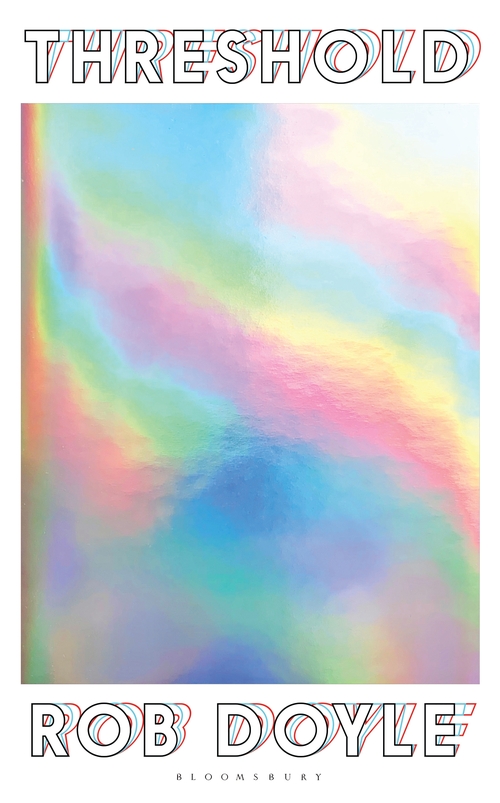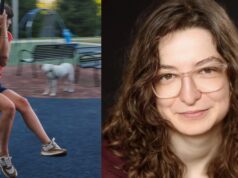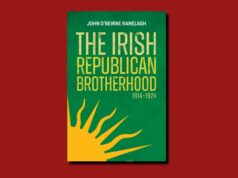Threshold
by Rob Doyle | Bloomsbury | £14.99 hb/£13.99 pb | 336pp | 9781526607034.
Review by Stephen Reid.
Self-contempt is the currency of the moment in auto-fiction, offered in exchange for self-indulgence.
This book could be summarised as a series of literary pilgrimages, gap years and correspondence to an unknown recipient, written from the perspective of a young man determined to get as high as possible, work as little as possible and experience the world as deeply as possible. This would be true in the sense that ‘Moby Dick is a book about a whale’. It is about the nature of writing, the nature of living. To Doyle they’re inextricable, an Ouroboros, self-consuming and self-generating.
There’s a complex dynamic when writing criticism of auto-fiction (a term used loosely to corral together books that eschew established genres, which has now become an established genre). A critique of a character’s motivation becomes a critique of an author, questions of fidelity or plausibility are nulled. How then do we talk about all this? ‘In short, a novel is anything I tell it to be’, he writes, and the reader must ascribe to this to buy in.
The eye-roll-worthy narrator won’t be new to anyone familiar with self-referential writers like Karl Ove Knausgaard or Ben Lerner. Doyle writes: ‘Having no skill for painting and being a mediocre musician, the best I could hope for was a few inadequate sentences in a book such as this one’. Self-contempt is the currency of the moment in auto-fiction, offered in exchange for self-indulgence. Many of the early observations are banal—on work, the desire to leave Ireland for the cultural lights of elsewhere, the entropic effects of social media—but these feel deliberate. They dissipate as the book progresses and a ‘self’ emerges that feels more grounded, stable and open.
There’s a sense of anxiety that pervades the book, like Irish author Mark O’Connell’s Note from an Apocalypse. Similar veins of anxiety marble both books, often societal, structural, ineffable in their span and weight, but pressing on both narrators, causing erratic thoughts, strange behaviour, ominous foreboding. The chapter ‘Hotel’ charts a period in which meditation replaces drugs in Doyle’s life. The positive impact of the practice is soon obvious, yet a tendency of his soon emerges: obsession, ascetic focus of energy. Sure, he calls himself a ‘lazy bastard’, but the diamond-tipped focus of his attention is undeniable, and directed toward drugs or the dharma, the velocity soon crashes. Hard.
His pursuit of desires—whether erotic, intellectual, or getting high—appear partly gnostic, partly epicurean and partly the familiar pursuit of someone fleeing himself in search of himself. The highs, as one might expect, are astounding, catastrophic, abyssal, dazzling; the lows strip the floorboards of misery, self-loathing, thought. This book bounces between two poles—everything means something; nothing means anything. There is no middle ground except that which we hurtle through.
‘By drifting from city to city, I could maintain the appearance of motion when in truth I was going nowhere.’ I could imagine the book being a play, Doyle at centre stage, moving so rapidly as to seem still, as props, substances, landmarks, sexual partners are rearranged around him; the motion relentless, the effect one of stasis. There would be, however, some crucial shift of tone, some widening light onto the whole arrangement, and by the time the curtain falls, there is a warmth from a scene that is, as the book likes to call itself, novel.
The book’s construction is less experimental or unprecedented than some reviewers suggest—last year Kevin Breathnach’s Tunnel Vision executed a similar balance between the unflinching auto-biographer and the cerebral, self-aware, pretentious critic, between the questionably fictional (the teasing nature of these books, the unknowable category, in our world of categories, is part of the fun) and the rooted-in-fact. The correspondence that intersperses the chapters adds a different dynamic, however, fracturing time (the book shifts back and forth in time, but the presence of present in the correspondence feels different, closer to the reader, confidential where the others at times feel declaratory) and developing the form of the auto-fictional ‘novel’.
Every chapter is populated with women in various guises of artistic posture, philosophical assuredness, and often sexual proximity to the narrator. These are flawed portraits, and never presented as otherwise, for the book could be categorised as a flawed portrait—the flaws are the grooves of interest; it’s difficult to find traction on an unblemished surface.
There is a moment that emerges about halfway through that cracks the entire structure open in a beautifully refreshing moment. Having ventured to Burgundy in homage to Georges Bataille, Doyle has a moment of realisation, a relinquishing of a pose that brings forward a character in a state of development, a character we may actually want to follow through the rest of the book. ‘Georges Bataille, whose grave and former home I was on my way to visit, was of dwindling interest to me.’ Bataille here represents a certain nihilist purview that the narrator had up to now fervently avowed, the dissolution of which marks a re-engagement with the potential of the world. At the end of this chapter, I wrote ‘The honesty feels as though its push outwards has reached something, achieved something palpable here’.
‘I took drugs so that one day I wouldn’t have to take drugs. The idea was that, by gaining access to the weirder potentialities of the consciousness, my basic stance towards existence would be altered: … I hoped I could come to experience consciousness itself, and the bare fact of being in the world, as ineffable, awesome, impregnably mysterious. The funny thing is that this really did happen.’ The drugs, ‘along with the art, literature and philosophy’ of his youth ‘help to reconfigure the lineaments of [his] consciousness so that, nowadays, the mere fact of being here at all, the fact that something exists, consistently astonishes me’.
The drugs—natural or synthetic, psychedelic or ‘stabilising’—are a legitimate focus for the book, the narrator and the author (the lines between all three are never clear), but the book’s true focus is internal, a dismantling and reconstituting of the ‘self’, and of the scaffold of philosophies and dependencies, relationships and drives, that Doyle has constructed, and believes in turn have constructed him. He builds a way out of the early pretentiousness, the steering towards nihilism, and comes out the other end, not stripped of the qualities that define the earlier ‘self’, but enhanced by growth. He outgrows these by confronting them. What’s left is something enervating after the self-loathing and horror, the abject and the banal; what’s left is potential, possibility, the cleanse after the purge.
***
Stephen Reid works in editorial with New Island Books and sales with Brookside Publishing Services.












